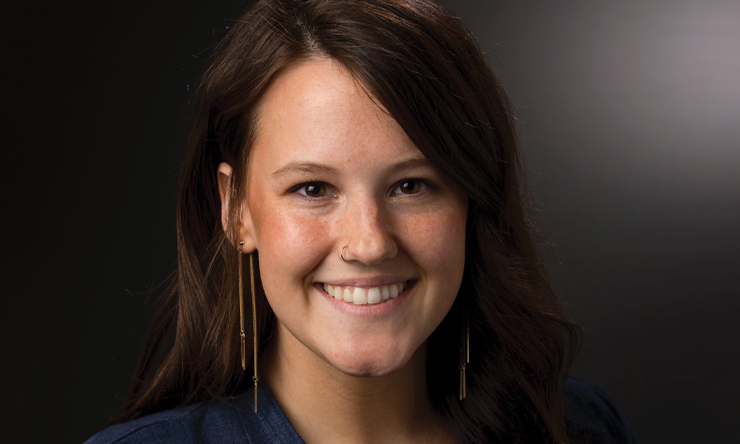Jim Leach delivered the inaugural lecture for the Middle East Institute on April 10, 2014 at Christ the King Chapel.
The Middle East Institute will foster academic study and community discussion regarding one of the most geopolitically important regions in the world.
Initial funding for the Institute has been provided by the Adler-Schermer Foundation.
Currently a visiting professor of law and the University of Iowa Chair in Public Affairs, Leach represented eastern Iowa in Congress for 30 years, many of those as a ranking member of the House Committee on International Relations. He has taught at the Princeton University Woodrow Wilson School in Princeton, N.J., served as an interim director of the Institute of Politics at the John F. Kennedy School of Government in Cambridge, Mass., and served as chair for the National Endowment for the Humanities in Washington DC.
The following is an interview with Leach concerning events in the Middle East conducted by the St. Ambrose University AmbroseZine.
Your interest in foreign policy began just a few blocks from the St. Ambrose campus?
"That was in the 8th grade. A teacher gave a class assignment to write two pages about what we wanted to be when we grew up, and I came home totally befuddled. I sat down at the dinner table and asked my parents for advice on what I should write about. My dad suggested that I go to the public library and check out a book on the Foreign Service. So I did. To my amazement, the Davenport Public Library had two books and I brought them home and wrote a brief paper about the Foreign Service. From that point on through college and graduate school, my oft-stated aspiration was to be an ambassador."
You did go on to work for the State Department, and obviously that background served you well in Congress.
"I probably spent more time on international issues than anyone I knew in Congress at that time. I served on the International Relations Committee, concentrating on Asian affairs and the Banking Committee which had under its purview international as well as domestic economic policy. Its jurisdiction included institutions like the International Monetary Fund and the World Bank as well as the Federal Reserve System. So from the beginning, my public career involved a deeply disproportionate concentration on foreign policy.
"Also there were a number of caucuses outside the formal committee system in Congress. Alternating with Sen. Paul Simon of Illinois, I chaired for years something called the Arms Control and Foreign Policy Caucus, which was one of the few caucuses that was both bi-institutional (House and Senate) and bi-partisan. In my early years I also chaired a Russian affairs study group, and later in my terms in Congress a uniquely influential Congressional-Executive Commission on China
How can a Middle East Institute on a small private campus in the middle of America foster understanding of a region rife with so many complex issues?
"First of all, I think it is an obligation of all educated people to have a sense for foreign affairs and the interplay of events around the world on American security and the American economy. A college grounded in the liberal arts like St. Ambrose can play a leading role from a number of perspectives. As a Catholic university, St. Ambrose by its nature is steeped in looking at issues from a faith based perspective. The Middle East is the birthplace of Christianity and also Judaism and Islam. These extraordinary religions have many things in common and also important traditions that are divergent. To understand the Middle East we need to understand our own faith system as well as how other traditions and histories differentiate with ours.
"History is strewn with moral issues. The Holocaust is without question the greatest sin mankind ever perpetuated on itself. It and its aftermath have created a special tie between America and Israel. But, to understand the Middle East we must also recognize that Muslims continually note that they weren't complicit in the Holocaust, Accordingly, they argue that they deserve to be recognized as holding certain legitimate historical claims. Unfortunately, as in many human relations, radicals tend to weaken moral positions when they employ terrorist tactics. Some like former Iranian President Mahmoud Ahmadinejad even ignite discord by irrationally denying that the Holocaust took place.
"To understand the myriad of issues at play and the underlying chemistry of the various peoples of the region is key to our national interest as well as to the humanitarian concerns of others. St. Ambrose with the inauguration of a Middle East Institute is uniquely situated to bring a Midwestern, faith-based perspective to the challenges of the region as well as greater understanding of their implications for our own society."
When you talk about what is unprecedented, we think of the "Arab Spring" and the impact of social media. Is that one of the dimensions you will address?
"Those are important developments, but certainly are not the only things that are unprecedented. We are living, after all, in a world of weapons of mass destruction. For the first time in human history, people are capable not only of prevailing in wars but also destroying life on the planet. That is an extraordinary burden of responsibility for ours and other governments. And, at the opposite end, we have new forces of anarchism that utilize less sophisticated but nevertheless socially destructive weapons. Anarchy is something that has probably existed in one way or another throughout history, but it has never before been globalized. Now it is. These are circumstances that no generation of people have ever confronted.
"They are challenges, not only for America, but for humankind."
How do you assess US-Israeli relations at this juncture and can the conflict with Palestine ever truly be resolved?
"Developing a framework for peace between Israel and its neighbors is one of the great challenges in modern times. Optimism is required but certitude of outcome is in doubt. It is conceivable that the conflict can be largely resolved and relations stabilized. But it is also quite conceivable that a cataclysm of truly tragic dimensions could manifest itself. The only credible option is to work continuously and forthrightly for a mutually acceptable accommodation."
Is it still possible for the US to play a mediating role in that situation?
"It's possible for the United States to play a constructive role. But it is naive to think that we can dictate to the parties an outcome. The principal responsibility falls on the parties in the Middle East although the likelihood of their being able to reach resolution is clearly higher if the US plays a facilitating role."
You have long been an advocate of negotiation regarding Iran's nuclear capabilities. How do you think the current approach to engagement is faring?
"Well, there are many unknowns. It is impossible to give any approach high marks with confidence. The prospect of Iran doing 100 percent of what we want is unlikely. The question becomes whether we and allied parties can engage Iran in such a way that we can make the situation substantially better than it otherwise might be. That's basically where we are."
Do you think current events in the Ukraine and Crimea are going to impact these negotiations, and have an impact on events in the Middle East in general?
"They could. Russia, for instance, may be less likely to play a constructive role. In the Cold War era, we looked at everything as a plus-minus in terms of relations with Russia. What was good for us was perceived to be bad for them and vice-versa. Actually, there are a few things in which we have a mutual interest. The Russians have no interest in having chemical weapons spread in the region, partly because they don't want chemical weapons to infiltrate dissident groups within their own Islamic population. Historically, the Russians have played a relatively constructive role at the International Atomic Energy Agency in that they share with us an antipathy to the spread of nuclear weapons.
"There have been some exceptions to this general position. They have, for instance, been more helpful to the Iranians than we might like. But in general, the Russians don't like the idea of Islamic neighbors with nuclear or chemical or biological weapons. So there are certain things in which we are likely to maintain a common interest, even though we have rather discordant relations today."
Syria appears to be an impossible quagmire. How can we begin to understand what is happening there, let alone affect a change?
"Misunderstanding peoples of the region and their governments is one of the reasons we are confronting one of the largest tragedies of the century. The Syrian civil war has analogous precedents in the last century - in countries like Rwanda and Cambodia, for instance. But to have as many displaced people, as many people killed with as great an intra-faith division, has perhaps never been witnessed on a scale this big in the Middle East.
"The fact that people outside of Syria on each side of the intra-faith divide have become involved in the Syrian dilemma makes the situation vastly more volatile, and makes drawing the US into the conflict that much more dangerous. Caution has to be the policy watchword"
Does this have the potential to grow larger throughout the region?
"It has implications beyond Syria and, potentially, beyond the Middle East. Let me give an example: Let us abstractly say an outside party comes in and identifies with one side in the conflict, then supporters of the other side's religion wherever they might be located around the world might feel that they have got to take actions against that outside party. This could cause a civil war to suddenly have worldwide dimensions."
You voted against the US going into Iraq. How do you assess what has happened since we left?
"First, let me stress that all Americans are in unanimity in being respectful of the troops that have been asked to engage in this conflict. The political judgment, on the other hand, to place them in harm's way remains deeply controversial. Whether it was wise or not to attack a country that did not attack us is a matter for every American to think through. It may be premature to come up with a judgment that one can state with certitude, but I believe that the possibility is not slight that historians generations hence will consider our intervention in Iraq to be one of the gravest geopolitical errors ever made by an American government.
"That's a possibility, but it's also possible that the judgment to intervene will be vindicated. But I think this judgmental prospect is growing less likely."
The exit strategy President Obama has for Afghanistan, do you favor that and how do you see it playing out?
"To some extent factors on the ground will continually always have to be taken into consideration. At the moment the government in Afghanistan has asked us to depart. Whether we leave some troops in the country and for how long will depend on how the new government in Afghanistan takes hold and what requests it makes in the future.
"Regarding the immediate past, I know very few experts in the field who think anything except that Washington strategists erred by taking our eyes off Afghanistan too early. If we had not become so deeply engaged in Iraq and instead put all of our attention on Afghanistan, we might have been in deeper and out earlier, with perhaps a more constructive result. But at this point in time, it looks as if policy judgments involve a Catch 22 - it is awkward to leave and awkward to stay."
Neighboring Pakistan is a large factor in anything regarding Afghanistan and the Middle East. Is there an approach to Pakistan that you think might work?
"You have to work at it, but the only obvious consideration is that our relationship with Pakistan has suffered enormously in the last decade. A cynic might say, ‘So what? It's just a distant country.' But it is a country with nuclear weapons. It's a country where the United States 20 years ago was well-respected. Today, for many Pakistanis, America is hated. That being the circumstance, one might want to reassess how wise our policy toward the Muslim world has been and work from there."
Thank you, Mr. Leach. We are very proud to have you help introduce this initiative at St. Ambrose.
"Well, I am honored to be involved. St. Ambrose is a lynchpin of the Quad City community. It is also a bellwether Catholic institution in America. So I am optimistic that this new Middle East Institute will serve students and the community well and add significantly to the national dialogue on issues central to our times."
News
Share This Story



